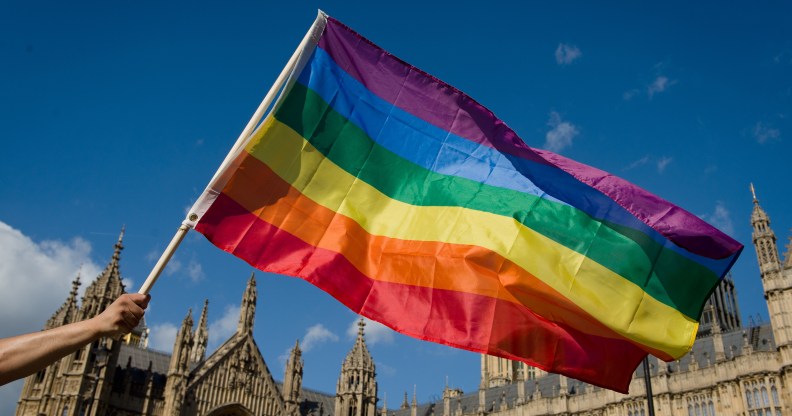Harassment not covered by discrimination regulations

A protester holds a rainbow flag outside the Houses of Parliament in central London on June 3, 2013, as protesters gather in support of same-sex marriage (LEON NEAL/AFP/Getty Images)
The Sexual Orientation Regulations for England, Wales and Scotland will not provide a protection against harassment included in the Northern Ireland regulations.
The Christian Institute, who are opposed to the new rules outlawing discrimination on the grounds of sexual orientation when accessing goods and services, reported the lack of a harassment regulation in their magazine.
A spokesman for the institute said that the story was run in the magazine purely for the information of their readers.
Stonewall, who has been working closely with the government on the regulations for England, Wales and Scotland, said they would differ from those in Northern Ireland.
“It is quite a technical issue to do with the legislative framework, which differs from that in Northern Ireland,” explained Alan Wardle, director of parliamentary and public affairs for Stonewall.
The government is currently conducting a review of discrimination laws, which will include an overhaul of all harassment legislation.
The review has been going on for over two years, is designed to try to simplify and improve the current situation.
Equality and anti-discrimination law has been built up in a patchy way and with differing levels of protection.
Mr Wardle assured the gay community that the exclusion of harassment regulations from the SOR in Britain was not a cause for concern:
“The forthcoming laws on goods and services will be robust and comprehensive and we have taken legal advice to ensure that issues like homophobic bullying will be covered,” he said.
Mr Wardle said that it was not the case that the SOR were going to be ‘watered down’ with regards to harassment and that it was Stonewall’s understanding that the discrimination law review would cover anti-gay harassment.
He added that yesterday’s comments by the Archbishop of Canterbury should not cause alarm, as it was expected that some protection for faith groups would be enshrined in the regulations.
The SOR in Northern Ireland, for example, make it clear that faith groups will be allowed to decide who is a member of their organisation and what use their premises can be put to.
Fr Martin Reynolds, of the Lesbian and Gay Christian Movement, said he was concerned that Christian Institute was telling its members there would be no harassment regulations in the SOR for Britain.
“Any diminution of the regulations is a matter of concern, though it is true they have to be practical and fair to all concerned,” he said.
The government has given numerous assurances that the SOR will be law by April.
However, the regulations require a positive vote from both Houses of Parliament and the Department for Communities and Local Government has refused to say when they will be published or laid before Parliament.
MPs and peers go on their Easter break on March 26th.
The Christian Institute, with the support of several churches, has obtained a judicial review of the way in which the consultation process about the regulations was conducted.
The process lasted six weeks, whereas in the rest of the UK it has taken six months.
The Sexual Orientation Regulations were introduced in Northern Ireland in January, despite the objections of the main political party in the province, the DUP.
Secretary of State for Northern Ireland Peter Hain used his powers to impose the legislation on Northern Ireland while the Assembly was suspended.
The Roman Catholic bishops in Ireland have come out in support of the legal review.
Catholics believe that homosexuals are disordered.
In England and Scotland, the church failed to gain an exemption from the regulations for their adoption agencies. From the end of 2008 they will have to comply with the new rules, which outlaw discrimination on the grounds of sexual orientation when accessing goods and services.
In the rest of the UK, the introduction of the Sexual Orientation Regulations has been delayed because of the large number of submissions to the government.

